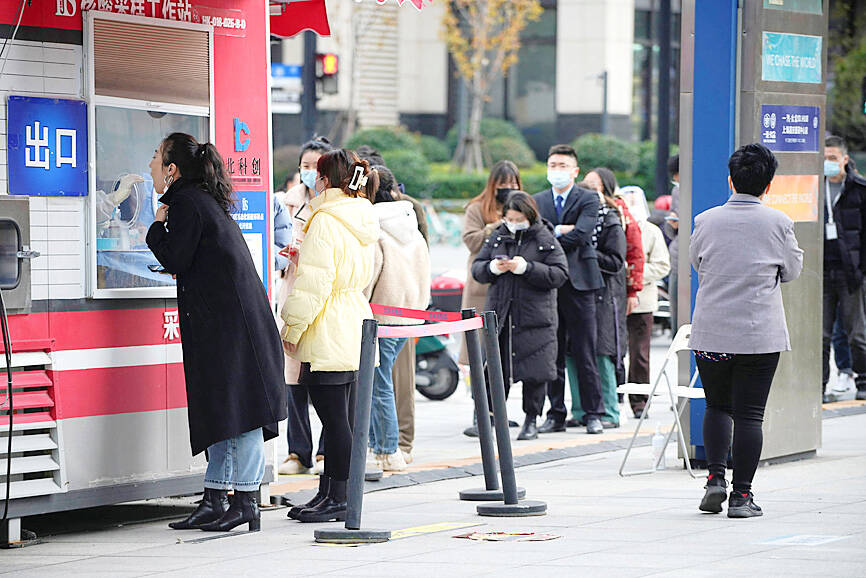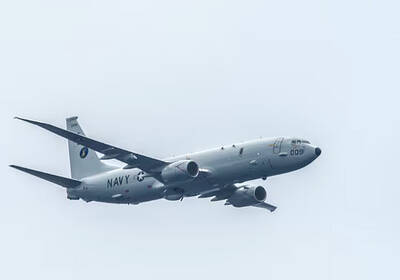Businesses reopened and testing requirements were relaxed in Beijing and other Chinese cities yesterday as the nation tentatively eased out of a strict “zero COVID-19” policy that sparked nationwide protests.
Local authorities across China have begun a slow rollback of the restrictions that have governed daily life for years, encouraged by the central government’s orders for a new approach to fighting the coronavirus.
In the capital, Beijing, where many businesses have fully reopened, commuters yesterday were no longer required to show a negative virus test taken within 48 hours to use public transport.

Photo: Reuters
Financial hub Shanghai — which underwent a brutal two-month lockdown this year — extended this measure to most public places except medical institutions, schools, restaurants and bars, nursing homes and indoor entertainment venues, starting from today.
The city had already exempted parks and tourist attractions from the testing requirement a day earlier, and what the latest rule change encompassed was unclear.
Neighboring Hangzhou ended regular mass testing for its 10 million people, except those living in or visiting nursing homes, schools and kindergartens.
The testing requirement for public transport had been scrapped on Sunday in the central city of Wuhan, where the coronavirus was first detected in late 2019, as well as in Shandong Province.
Zhengzhou — home to the world’s largest iPhone factory — on Sunday said that people would be allowed to enter public places, take public transport and enter their residential compounds without a 48-hour negative test result, too.
However, as officials have dismantled testing facilities, long lines have appeared around those that remain, forcing residents to wait in cold temperatures to get tests that remain obligatory across much of China.
“Students can’t go to school without a 24-hour negative test,” a Sina Weibo user wrote.
“What’s the point in closing testing booths before dropping the need to show test results completely?” another asked.
In the northwestern city of Urumqi, where a fire that killed 10 people became the catalyst for the recent anti-lockdown protests, supermarkets, hotels, restaurants and ski resorts reopened yesterday.
The city of more than 4 million in Xinjiang endured one of China’s longest lockdowns, with some areas shut from August until last month.
The demonstrations last week were the largest in decades as public anger at prolonged virus restrictions boiled over, with many university campuses involved.
China’s vast security apparatus has moved swiftly to smother the rallies, deploying a heavy police presence while boosting online censorship and surveillance of the population, but sporadic localized clashes have continued to flare up.

ROLLER-COASTER RIDE: More than five earthquakes ranging from magnitude 4.4 to 5.5 on the Richter scale shook eastern Taiwan in rapid succession yesterday afternoon Back-to-back weather fronts are forecast to hit Taiwan this week, resulting in rain across the nation in the coming days, the Central Weather Administration said yesterday, as it also warned residents in mountainous regions to be wary of landslides and rockfalls. As the first front approached, sporadic rainfall began in central and northern parts of Taiwan yesterday, the agency said, adding that rain is forecast to intensify in those regions today, while brief showers would also affect other parts of the nation. A second weather system is forecast to arrive on Thursday, bringing additional rain to the whole nation until Sunday, it

CONDITIONAL: The PRC imposes secret requirements that the funding it provides cannot be spent in states with diplomatic relations with Taiwan, Emma Reilly said China has been bribing UN officials to obtain “special benefits” and to block funding from countries that have diplomatic ties with Taiwan, a former UN employee told the British House of Commons on Tuesday. At a House of Commons Foreign Affairs Committee hearing into “international relations within the multilateral system,” former Office of the UN High Commissioner for Human Rights (OHCHR) employee Emma Reilly said in a written statement that “Beijing paid bribes to the two successive Presidents of the [UN] General Assembly” during the two-year negotiation of the Sustainable Development Goals. Another way China exercises influence within the UN Secretariat is

CHINA REACTS: The patrol and reconnaissance plane ‘transited the Taiwan Strait in international airspace,’ the 7th Fleet said, while Taipei said it saw nothing unusual The US 7th Fleet yesterday said that a US Navy P-8A Poseidon flew through the Taiwan Strait, a day after US and Chinese defense heads held their first talks since November 2022 in an effort to reduce regional tensions. The patrol and reconnaissance plane “transited the Taiwan Strait in international airspace,” the 7th Fleet said in a news release. “By operating within the Taiwan Strait in accordance with international law, the United States upholds the navigational rights and freedoms of all nations.” In a separate statement, the Ministry of National Defense said that it monitored nearby waters and airspace as the aircraft

Taiwan’s first drag queen to compete on the internationally acclaimed RuPaul’s Drag Race, Nymphia Wind (妮妃雅), was on Friday crowned the “Next Drag Superstar.” Dressed in a sparkling banana dress, Nymphia Wind swept onto the stage for the final, and stole the show. “Taiwan this is for you,” she said right after show host RuPaul announced her as the winner. “To those who feel like they don’t belong, just remember to live fearlessly and to live their truth,” she said on stage. One of the frontrunners for the past 15 episodes, the 28-year-old breezed through to the final after weeks of showcasing her unique